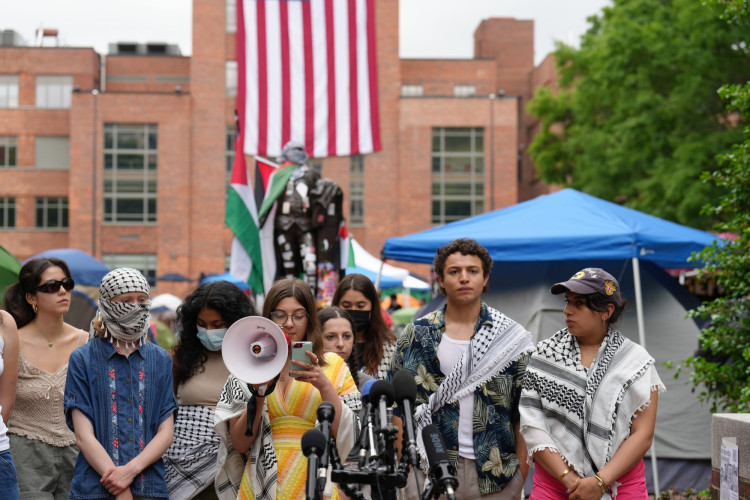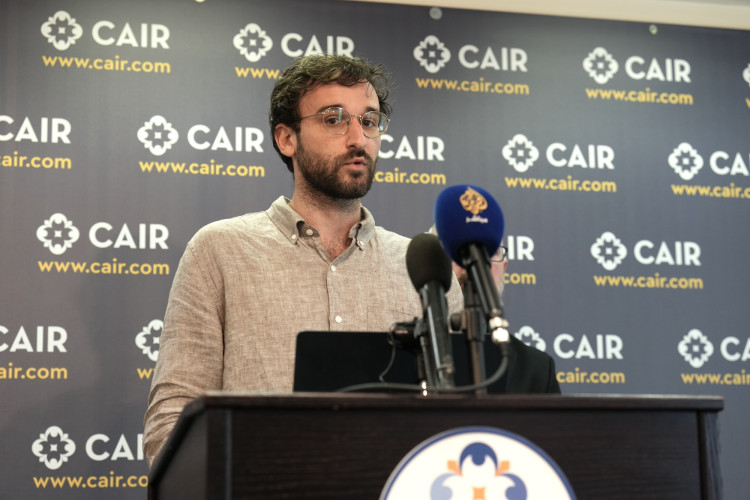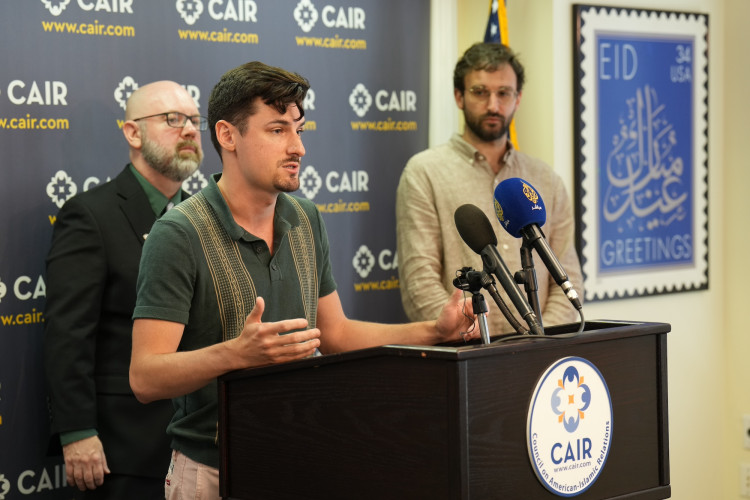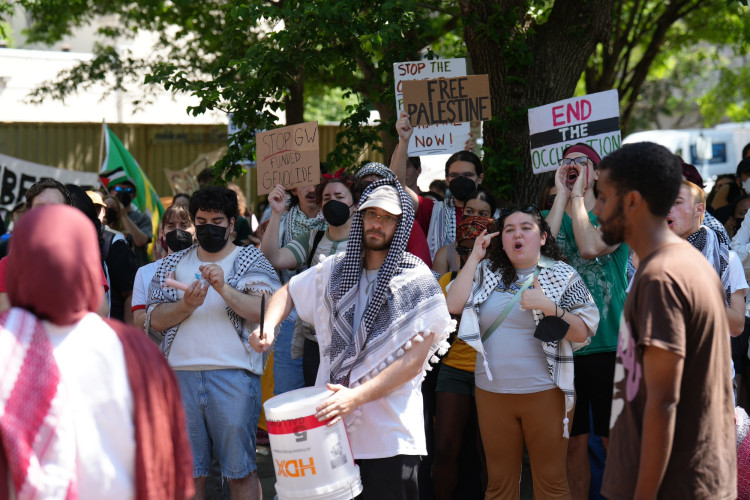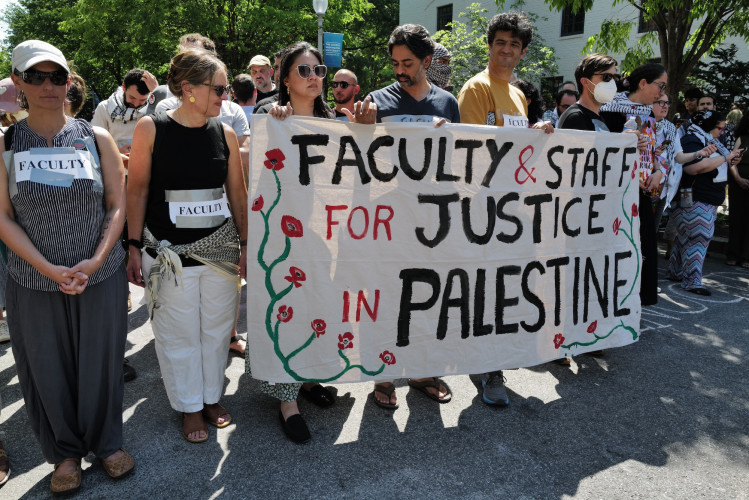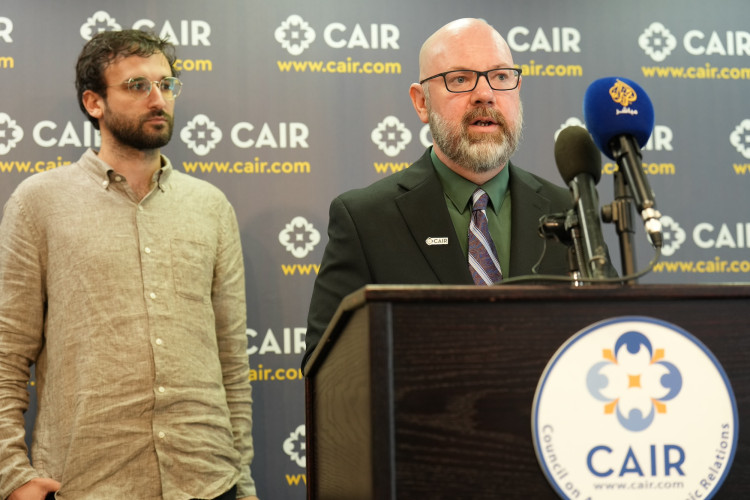From the Open-Publishing Calendar
From the Open-Publishing Newswire
Indybay Feature
Palestine
California
U.S.
Anti-War
Education & Student Activism
Police State & Prisons
Racial Justice
Returning Gaza Student Protesters Face Punitive Welcome
As university and college students prepare to return to campus for the new school year, many find themselves in legal limbo for their participation in the anti-Genocide student encampments protesting Israel’s war in Gaza at the end of the last school year.
WASHINGTON (08-14) – As university and college students prepare to return to campus for the new school year, many find themselves in legal limbo for their participation in the anti-Genocide student encampments protesting Israel’s war in Gaza at the end of the last school year.
On August 14, the Council on American-Islamic Relations (CAIR), Arab American Anti-Discrimination Committee (ADC) and Palestine Legal held a press conference to discuss how universities are punishing returning students for their participation in the protests.
CAIR today named three universities as “institutions of particular concern,” ie. George Washington University (GW) in Washington, DC, University of California, Los Angeles (UCLA) and Emory University in Atlanta, Georgia.
As an example of punishment for their involvement in protests, some student protesters who were arrested at GW, according a Washington Post article on August 10, would have to agree to accept certain conditions in order to return and “…may be able to have their charges dropped — but only if they accepted a deal that would restrict their access to campus for six months.”
The list of strict conditions was reported as “not being able to enter dining halls, nor study sessions in the library. No meeting up with friends for coffee.” And that, “students would only be allowed to go to and from their residence and classes, with exceptions for accessing the hospital or using the metro.”
The conditions as set forth in the agreement constitute a form of “house arrest” while using the term “may” for the dropping of charges, still leaves students with no guarantee that will in fact be the case. Additionally, the condition of denying such access to educational resources for some students at the private university who pay tuition as high as $70,000 a year is both punitive and discriminatory in nature and without merit.
In disallowing access to those resources, the university has created two classes of students by discriminating against those who have participated in the protests.
Dylan Sabah, staff attorney for Palestine Legal, spoke of how “For years university administrations under pressure from donors and outside lobby groups have sought to suppress Palestine advocacy on their campuses.” And in so doing, he iterated how civil and constructional rights of students have been violated.
Going further, he told of how some universities have allowed “outside actors” to gain access to their campuses to harass and “dox” students and that some have banned entire student groups including Jewish and Palestinian as well as others for engaging in “protected political expression in demanding an end to the genocide and an end to support for Israel.”
Out of student frustration of not being heard by administrations, students began their protests in setting up encampments to demand a ceasefire and an end to the university’s complicity in the genocide.
Those actions in turn saw administrations respond by calling in police to break up the encampments, with police brutalizing and arresting students, faculty and staff. Sabah commented further noting that that reaction is a “profound embarrassment to these universities who pretend to support free expression and political engagement.”
In closing, he said the universities “…remain committed in silencing dissent and protecting the interest of the powerful against the righteous anger of the many.” He suggested that institutions should join in with their students to be “on the right side of history.”
Chris Godshall-Bennett, Legal Director of the Arab American Anti-Discrimination Committee, accused universities of a “disturbing phenomenon of students begin leveled with extreme discipline charges…prior to any hearing being conducted.” He named GW as a “particularly brutal example” of punishment where students were brought before student conduct panels having already had their housing revoked in advance.
He followed by describing those students engaged in the protests and encampments as the “Beating heart of American solidarity for Palestine.”
In closing, Corey Saylor, CAIR Research and Advocacy Director, announced that its “Unhostile Campus Campaign,” titled “Hostile” concerning the “Targeting of Anti-Genocide protesters while enabling Anti-Palestinian Racism and Islamophobia” has been mailed to 600 university administrators across the country.
The analysis exposes the role that universities have played in targeting students protesting the Israeli government’s ongoing genocide against Palestinians in Gaza.
He suggested that “While campuses welcome back students we should celebrate and protect such students, not focus on harsh punishments for protesters.”
Although today’s announcement covered only three universities, Saylor promised that in the weeks ahead CAIR would be adding other institutions of higher learning to their “institutions of particular concern” list.
Report and photos by Phil Pasquini
© 2024 nuzeink all rights reserved worldwide
On August 14, the Council on American-Islamic Relations (CAIR), Arab American Anti-Discrimination Committee (ADC) and Palestine Legal held a press conference to discuss how universities are punishing returning students for their participation in the protests.
CAIR today named three universities as “institutions of particular concern,” ie. George Washington University (GW) in Washington, DC, University of California, Los Angeles (UCLA) and Emory University in Atlanta, Georgia.
As an example of punishment for their involvement in protests, some student protesters who were arrested at GW, according a Washington Post article on August 10, would have to agree to accept certain conditions in order to return and “…may be able to have their charges dropped — but only if they accepted a deal that would restrict their access to campus for six months.”
The list of strict conditions was reported as “not being able to enter dining halls, nor study sessions in the library. No meeting up with friends for coffee.” And that, “students would only be allowed to go to and from their residence and classes, with exceptions for accessing the hospital or using the metro.”
The conditions as set forth in the agreement constitute a form of “house arrest” while using the term “may” for the dropping of charges, still leaves students with no guarantee that will in fact be the case. Additionally, the condition of denying such access to educational resources for some students at the private university who pay tuition as high as $70,000 a year is both punitive and discriminatory in nature and without merit.
In disallowing access to those resources, the university has created two classes of students by discriminating against those who have participated in the protests.
Dylan Sabah, staff attorney for Palestine Legal, spoke of how “For years university administrations under pressure from donors and outside lobby groups have sought to suppress Palestine advocacy on their campuses.” And in so doing, he iterated how civil and constructional rights of students have been violated.
Going further, he told of how some universities have allowed “outside actors” to gain access to their campuses to harass and “dox” students and that some have banned entire student groups including Jewish and Palestinian as well as others for engaging in “protected political expression in demanding an end to the genocide and an end to support for Israel.”
Out of student frustration of not being heard by administrations, students began their protests in setting up encampments to demand a ceasefire and an end to the university’s complicity in the genocide.
Those actions in turn saw administrations respond by calling in police to break up the encampments, with police brutalizing and arresting students, faculty and staff. Sabah commented further noting that that reaction is a “profound embarrassment to these universities who pretend to support free expression and political engagement.”
In closing, he said the universities “…remain committed in silencing dissent and protecting the interest of the powerful against the righteous anger of the many.” He suggested that institutions should join in with their students to be “on the right side of history.”
Chris Godshall-Bennett, Legal Director of the Arab American Anti-Discrimination Committee, accused universities of a “disturbing phenomenon of students begin leveled with extreme discipline charges…prior to any hearing being conducted.” He named GW as a “particularly brutal example” of punishment where students were brought before student conduct panels having already had their housing revoked in advance.
He followed by describing those students engaged in the protests and encampments as the “Beating heart of American solidarity for Palestine.”
In closing, Corey Saylor, CAIR Research and Advocacy Director, announced that its “Unhostile Campus Campaign,” titled “Hostile” concerning the “Targeting of Anti-Genocide protesters while enabling Anti-Palestinian Racism and Islamophobia” has been mailed to 600 university administrators across the country.
The analysis exposes the role that universities have played in targeting students protesting the Israeli government’s ongoing genocide against Palestinians in Gaza.
He suggested that “While campuses welcome back students we should celebrate and protect such students, not focus on harsh punishments for protesters.”
Although today’s announcement covered only three universities, Saylor promised that in the weeks ahead CAIR would be adding other institutions of higher learning to their “institutions of particular concern” list.
Report and photos by Phil Pasquini
© 2024 nuzeink all rights reserved worldwide
For more information:
https://www.facebook.com/media/set/?vanity...
Add Your Comments
We are 100% volunteer and depend on your participation to sustain our efforts!
Get Involved
If you'd like to help with maintaining or developing the website, contact us.
Publish
Publish your stories and upcoming events on Indybay.
Topics
More
Search Indybay's Archives
Advanced Search
►
▼
IMC Network


